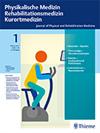癌症患者工作支持康复的疗效:随机对照试验的元分析
IF 0.5
4区 医学
Q4 REHABILITATION
Physikalische Medizin Rehabilitationsmedizin Kurortmedizin
Pub Date : 2022-01-05
DOI:10.1055/a-2006-4248
引用次数: 0
摘要
摘要引言癌症患者工作支持康复的疗效仍然存在争议。我们进行了系统回顾和荟萃分析,以探讨与工作相关的支持康复对癌症患者生活质量的影响。方法我们检索了截至2021年8月的Pubmed、Embase、Web of science、Ebsco和Cochrane图书馆数据库,以进行随机对照试验(RCT),评估与工作相关的支持康复对癌症患者生活质量的影响。该荟萃分析使用随机效应模型进行。结果荟萃分析包括4项随机对照试验。总体而言,与癌症患者的常规护理相比,与工作相关的支持与生活质量体力评分的显著改善(PCS,标准平均差[SMD]=0.22;95%置信区间[CI]=0.06-0.37;P=0.005)和生活质量疼痛的减少(SMD=−0.16;95%CI=−0.31-0;P=0.04)相关,但对生活质量心理评分(MCS,SMD=0;95%CI=-0.28至0.28;P=0.98)、复工时间(SMD=-0.78;95%CI=-2.71至1.14;P=0.43)无明显影响,工作能力(SMD=−0.01;95%CI=−0.16~9.09;P=0.013)和工作限制(SMD=0.12;95%CI=−0.16至0.40;P=0.041)。本文章由计算机程序翻译,如有差异,请以英文原文为准。
Efficacy of Work-Related Support Rehabilitation for Patients with Cancer: A Meta-Analysis of Randomized Controlled Trials
Abstract Introduction The efficacy of work-related support rehabilitation for patients with cancer remains controversial. We conduct a systematic review and meta-analysis to explore the influence of work-related support rehabilitation on the quality of life in patients with cancer. Methods We have searched Pubmed, Embase, Web of science, Ebsco, and Cochrane library databases through August 2021 for randomized controlled trials (RCTs) assessing the effect of work-related support rehabilitation on the quality of life in patients with cancer. This meta-analysis is performed using the random-effect model. Results Four RCTs are included in the meta-analysis. Overall, compared with usual care for cancer patients, work-related support is associated with significantly improved quality of life physical score (PCS, standard mean difference [SMD]=0.22; 95% confidence interval [CI]=0.06 to 0.37; P=0.005) and reduced quality of life pain (SMD=−0.16; 95% CI=−0.31 to 0; P=0.04), but showed no obvious impact on quality of life mental score (MCS, SMD=0; 95% CI=−0.28 to 0.28; P=0.98), time of return to work (SMD=−0.78; 95% CI=−2.71 to 1.14; P=0.43), or the scores of work ability (SMD=−0.01; 95% CI=−0.16 to 9.09; P=0.13) and work limitation (SMD=0.12; 95% CI=−0.16 to 0.40; P=0.41). Conclusions Work-related support rehabilitation may be effective to improve the quality of life of cancer patients.
求助全文
通过发布文献求助,成功后即可免费获取论文全文。
去求助
来源期刊
CiteScore
1.10
自引率
25.00%
发文量
70
审稿时长
3 months
期刊介绍:
The Journal of Physical and Rehabilitation Medicine offers you the most up-to-date information about physical medicine in clinic and practice, as well as interdisciplinary information about rehabilitation medicine and spa medicine.
Publishing 6 issues a year, the journal includes selected original research articles and reviews as well as guidelines and summaries of the latest research findings. The journal also publishes society news and editorial material. “Online first” publication ensures rapid dissemination of knowledge.

 求助内容:
求助内容: 应助结果提醒方式:
应助结果提醒方式:


